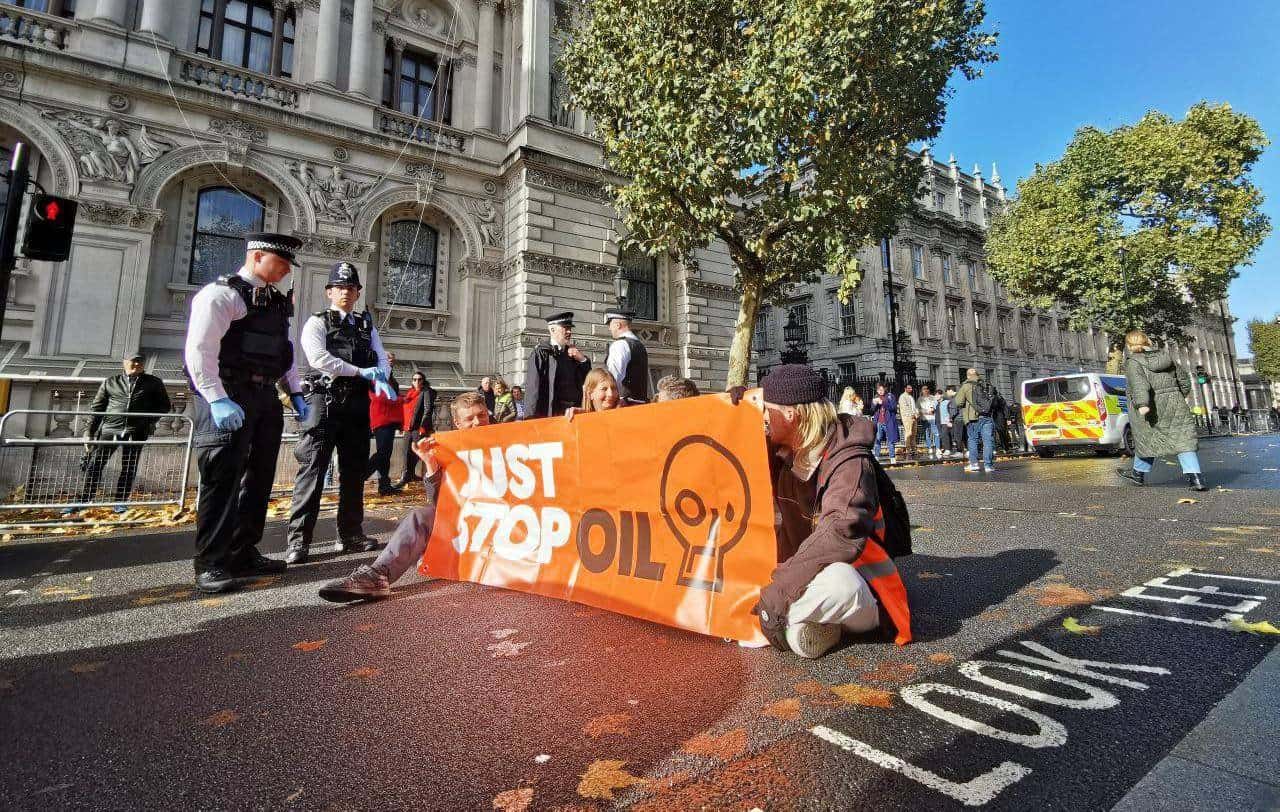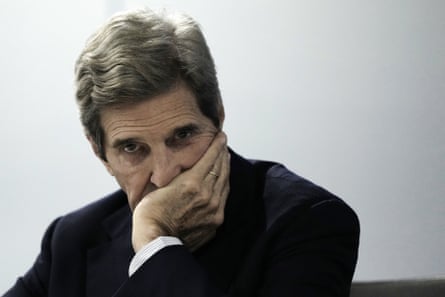
Little Progress Made Toward Emissions Cuts Needed to Meet Paris Agreement Goals
Bob Berwyn / Inside Climate News & Fiona Harvey / The Guardian
SHARM EL-SHEIKH, Egypt (November 18, 2022) — The COP27 climate conference in Egypt may be remembered as the moment when the world gave up on limiting global warming to 1.5 degrees Celsius, the most ambitious goal set by the 2015 Paris Agreement.
Late Friday, the last scheduled day of the climate talks in Sharm el-Sheikh, the heads of the national delegations were still meeting to discuss whether the final documents should include a reference to that temperature target, which scientists call a limit that, if breached, would push some Earth systems past dangerous and irreversible tipping points.
This year’s annual meeting was billed as the “implementation COP,” but so far “nothing has been implemented, and it has thus failed to achieve what it set out to do,” said Stephanie Hirmer, a senior researcher at the University of Oxford’s energy and power group. “While everyone knows the 1.5-degree target is off the table, it is not openly discussed in official sessions,” she said.
The only way to stay under that limit, a recent United Nations Environment Programme report concluded, would be for industrialized nations to rapidly reduce greenhouse gas emissions—cutting them by about half in the next eight years and to zero by 2050—but nothing that happened at this year’s two-week conference has increased the likelihood that will happen.
Right now, according to a U.N. report released just before COP27, the pledges to reduce greenhouse gas emissions put the planet on a path to heat between 2.1 and 2.9 degrees, which would lead to catastrophic climate impacts, including even more deadly heatwaves, worsening droughts and water shortages, crop failures, as well degradation of ecosystems that could wipe out some species of mammals, insects, birds and plants.
For two weeks, “rich countries have stonewalled, delayed and distracted … trying to kick the can down the road with more demands for assessments, reports and dialogues,” said Teresa Anderson, the global lead for climate justice for ActionAid International, an NGO focused on women’s rights, poverty and climate equity.
The U.N. Environment Programme Emissions Gap report that was released ahead of the climate conference concluded there is “no credible pathway to 1.5°C in place,” and that “Only an urgent system-wide transformation can avoid climate disaster.”
There were no signs of that kind of change at COP27, said Astrid Martins Kabengele, representing the Democratic Republic of Congo at the talks as a rapporteur on economic and social issues.
“It’s an economic COP. It’s nothing more,” she said. “This is the fourth COP that I’ve attended that is the same thing at the end, with developed countries organizing this COP to make their own money. They are not coming up with a solution. They are asking us not to use our oil, not to use our gas. So what are they giving us,” she said.
Recent reports from the Intergovernmental Panel on Climate Change show that it’s still theoretically possible to limit global warming to 1.5 degrees Celsius, but most of the paths toward that goal rely on removing large quantities of carbon dioxide directly from the air, an option that may never be economically viable at the scale required.
Nevertheless, it’s important that the goal of stopping warming at 1.5 degrees Celsius stays on the table, because its removal “opens the door for delegates here and governments to try to pull more towards Paris Agreement language of 2C, which will be catastrophic,” said Alexis McGivern, a researcher at Oxford University working on net zero standards for non-state entities.
“After a few shaky days where we saw language on 2C shift from ‘catastrophic’ down to ‘increasingly severe climate impacts,’ it’s good to see 1.5 reiterated in the current draft of the cover text,” she said. “The emissions gap report released before COP27 makes it clear that there is still a pathway to 1.5, but the door is closing. We must focus on building that pathway rather than re-hashing whether or not 1.5 is a realistic target.”

Growing Inequality Hinders Progress
Civil society observers at COP27 said they are concerned about a growing imbalance of power between developed and developing countries that threatens to break down consensus on global climate policy and slow progress even more.
Instead of making headway in reducing greenhouse gas emissions to limit warming, some new agreements on the use of fossil fuels discussed at the conference are likely to keep the world from undertaking those efforts, said Sébastien Duyck, a senior attorney with the Center for International Environmental Law.
Rather than focusing on climate change as a human rights issue, “this COP has been marred with the promotion of false solutions,” he said. One of the draft documents circulating on what was planned to be the last day of the conference even stripped out language that acknowledges core human rights, such as the right to a healthy environment. “This is, of course, the end result of a COP with a wild imbalance of power,” he said.
The frustrations about the COP27 negotiations extended to the highest level, with U.N. Secretary General António Guterres expressing concern about so-called net zero targets that rely on carbon trading and offsets to achieve climate goals. Under such programs, countries and companies can keep emitting greenhouse gases by buying credits, planting trees or preserving patches of forest that theoretically absorb those emissions.
Ahead of the conference, Guterres said that “the criteria and benchmarks for these net-zero commitments have varying levels of rigor and loopholes wide enough to drive a diesel truck through.”
That shows that the fossil fuel industry is still driving the climate train, said Brian O’Callaghan, lead researcher with Oxford University’s economic recovery project. He said there have been some successes at the climate talks over the decades, but that it’s mostly been “27 years of obstructionism, delay, and greenwashing. If COP were a football rivalry, it would be amongst the most lopsided; fossil fuel Interests: 27, humankind: 0.”
He said that, in some ways, the process has moved backwards. In 1992, when the U.N. Framework Convention on Climate Change was adopted, rich countries agreed to pay for all forms of mitigation and adaptation.
“Today, developed countries do all that they can to avoid that promise,” he said. “The multilateral system is based on trust and every year developed countries are eroding that trust.”
And even though developing countries are eager to decarbonize, they are hamstrung by lack of money.
“Unfortunately, we have seen little change here in Sharm el-Sheikh,” O’Callaghan said.
Current plans to decarbonize the world’s economies by 2050 rely heavily on carbon offset and trading programs, but Guterres said there must be “zero tolerance for net-zero greenwashing.” The pledges must be aligned with scientific scenarios of limiting warming and they should cover all types of greenhouse gas emissions, he said.
“Let’s tell it like it is,” he said. “Using bogus net-zero pledges to cover up massive fossil fuel expansion is reprehensible. It is rank deception. This toxic cover-up could push our world over the climate cliff. The sham must end.”
Bob Berwyn an Austria-based reporter who has covered climate science and international climate policy for more than a decade. Previously, he reported on the environment, endangered species and public lands for several Colorado newspapers, and also worked as editor and assistant editor at community newspapers in the Colorado Rockies.
The world is still ‘on brink of climate catastrophe’ after COP27
COP27’s Legacy: A Deal on
Loss-and-Damage but a Blow to 1.5C
SHARM EL-SHEIKH, Egypt (November 20, 2022) — The world still stands “on the brink of climate catastrophe” after the deal reached at the Cop27 UN climate summit on Sunday, and the biggest economies must make fresh commitments to cut greenhouse gas emissions, climate experts and campaigners have warned.
The agreement reached in Sharm el-Sheikh early on Sunday morning, after a marathon final negotiating session that ran 40 hours beyond its deadline, was hailed for providing poor countries for the first time with financial assistance known as loss and damage. A fund will be set up by rich governments for the rescue and rebuilding of vulnerable areas stricken by climate disaster, a key demand of developing nations for the last 30 years of climate talks.
But the outcome was widely judged a failure on efforts to cut carbon dioxide, after oil-producing countries and high emitters weakened and removed key commitments on greenhouse gases and phasing out fossil fuels.
Mary Robinson, chair of the Elders Group of former world leaders, ex-president of Ireland and twice a UN climate envoy, said: “The world remains on the brink of climate catastrophe. Progress made on [cutting emissions] has been too slow. We are on the cusp of a clean energy world, but only if G20 leaders live up to their responsibilities, keep their word and strengthen their will. The onus is on them.”
António Guterres, secretary general of the UN, warned: “Our planet is still in the emergency room. We need to drastically reduce emissions now – and this is an issue this COP did not address. The world still needs a giant leap on climate ambition.”

Oil-producing countries had thwarted attempts to strengthen the deal, said Laurence Tubiana, one of the architects of the 2015 Paris climate agreement, now chief executive of the European Climate Foundation.
“The influence of the fossil fuel industry was found across the board,” she said. “This Cop has weakened requirements around countries making new and more ambitious commitments [on cutting emissions]. The text [of the deal] makes no mention of phasing out fossil fuels, and scant reference to the 1.5C target.”
She blamed the host country, Egypt, for allowing its regional alliances to sway the final decision, a claim hotly denied by the hosts. Next year’s conference of the parties under the UN Framework Convention on Climate Change (Cop) will take place in Dubai, hosted by the United Arab Emirates, one of the world’s biggest oil exporters.
Tubiana warned: “The Egyptian presidency produced a text that clearly protects oil and gas petro-states and the fossil fuel industries. This trend cannot continue in the UAE next year.”
At the talks, nearly 200 countries agreed that a fund for loss and damage, which would pay out to rescue and rebuild the physical and social infrastructure of countries ravaged by extreme weather events, should be set up within the next year.
However, there is no agreement yet on how much money should be paid in, by whom, and on what basis. A key aim for the EU at the talks was to ensure that countries classed as developing in 1992 when the UNFCCC was signed – and thus given no obligations to act on emissions or provide funds to help others – are considered potential donors. These could include China, Saudi Arabia and other Gulf states, and Russia.
Under the final agreement, such countries can contribute on a voluntary basis.
John Kerry, the US special presidential envoy for climate, who tested positive for Covid on Friday night and spent the rest of the summit self-isolating in his hotel, fixed China in his sights in a statement after the conference concluded.

US Climate Envoy John Kerry.
“Reducing emissions in time is about maths, not ideology. That’s why all nations have a stake in the choices China makes in this critical decade,” he said. China is the world’s biggest emitter of greenhouse gases, as well as the world’s second biggest economy, and comes second only to the US in cumulative historical emissions since the industrial revolution.
“The US and China should be able to accelerate progress together, not only for our sake, but for future generations. And we are all hopeful that China will live up to its global responsibility.”
Paul Bledsoe, a former Clinton White House climate adviser, now with the Progressive Policy Institute in Washington DC, said: “It’s time for the US to work with developing nations to put pressure on China, or climate protection will become impossible. China should be a climate outcast, along with Russia.”
Several key commitments championed by the UK, which hosted last year’s Cop26 climate summit in Glasgow, were dropped from the final deal, at the behest mainly of Saudi Arabia and other petro-states, though the Guardian understands that China, Russia and Brazil also played a role in weakening some aspects.
These included a target for global emissions to peak by 2025, in line with the goal of limiting temperature rises to 1.5C above pre-industrial levels, the threshold of safety that was the focus of the Glasgow Climate Pact signed last year at Cop26.
Although the final text did include the commitment to limiting temperature rises to 1.5C, the language was regarded as weak and marking no progress on the outcome of Cop26 a year ago.

Alok Sharma, the UK’s Cop26 president, sacked as a minister by Rishi Sunak, was visibly angry at the close of the conference. “Those of us who came to Egypt to keep 1.5C alive, and to respect what every single one of us agreed to in Glasgow, have had to fight relentlessly to hold the line. We have had to battle to build on one of the key achievements of Glasgow, the call on parties to revisit and strengthen their [national plans on emissions].”
In Glasgow, in the final moments a commitment to phase out coal was watered down by China and India to a phase down of coal, a last-minute trial that reduced Sharma to the brink of tears. At Cop27, he joined with efforts to include a phase down of all fossil fuels in the text, but it was reduced in the final stages to a simple repetition of the Glasgow commitment to phase down coal.
Sharma listed commitments weakened or lost, hitting the table for emphasis: “We joined with many parties to propose a number of measures that would have contributed to this. Emissions peaking before 2025, as the science tells us is necessary. Not in this text. Clear follow-through on the phase down of coal. Not in this text. A commitment to phase out all fossil fuels. Not in this text. And the energy text, weakened in the final minutes [to endorse “low-emissions energy”, which can be interpreted as a reference to gas].”
In the end the responsibility will lie with everyone, as Meena Raman of Third World Network, an adviser to developing countries, points out:
“Since the EU and Alok Sharma are disappointed that fossil fuel phase-out is not in the text, we would like them to take leadership and revise their NDCs [nationally determined contributions] and put into plans their fossil fuel phase-out urgently and stop expansion of fossil fuels including oil and gas. [It’s] not enough to play to the gallery but act if they really want to save the planet and not hide behind 2050 net zero targets, which will bust the remaining carbon budget for 1.5C.”
Sharma concluded: “I said in Glasgow that the pulse of 1.5C was weak. Unfortunately, it remains on life support.”
Postscript from The Guardian
There can be no more hiding, and no more denying. Global heating is supercharging extreme weather at an astonishing speed. Guardian analysis recently revealed how human-caused climate breakdown is accelerating the toll of extreme weather across the planet. People across the world are losing their lives and livelihoods due to more deadly and more frequent heatwaves, floods, wildfires and droughts triggered by the climate crisis.
At the Guardian, we will not stop giving this life-altering issue the urgency and attention it demands. We have a huge global team of climate writers around the world and have recently appointed an extreme weather correspondent.
Our editorial independence means we are free to write and publish journalism which prioritises the crisis.
Posted in accordance with Title 17, Section 107, US Code, for noncommercial, educational purposes.
